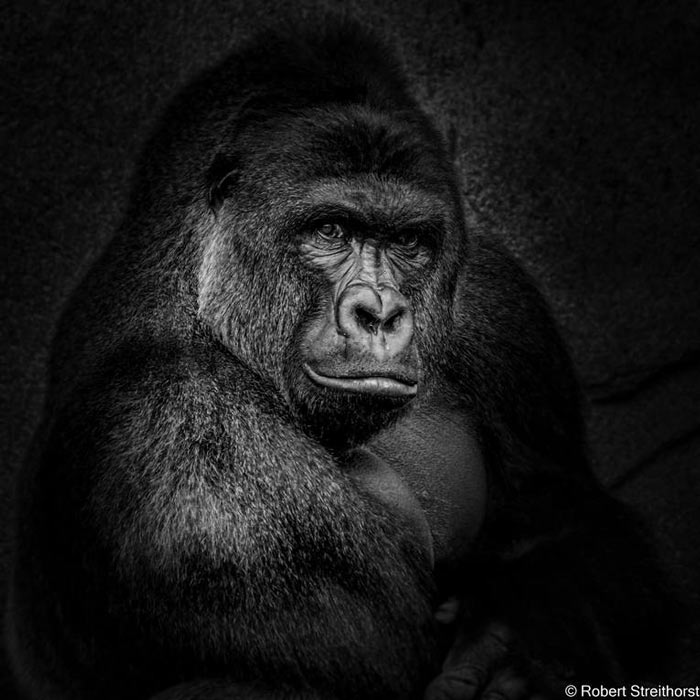Like many of you, I have been inundated by the media buzz surrounding the killing of the gorilla Harambe. Unless you have been living under a rock for the past few weeks, you know that the gorilla Harambe was killed by the zookeepers at the Cincinnati Zoo due to a 3-year-old child falling into the gorilla’s enclosure. Let me say from the beginning: the whole event was tragic. It was tragic that the gorilla had to be killed. It was a tragedy that the little 3-year-old suffered the horror of falling into the enclosure before being drug around the water while suffering great injury by the 450-pound beast. It is a tragedy! Far more troubling is the feedback that reactionary, controversy-loving, internet moguls have had pertaining to the case. Many people across social media have begun protesting the gorilla’s death. Some naturalist protesters have even issued threats to the mother of the 3-year-old boy. All-in-all, this harassing reaction has brought to mind modern thinking that demonstrate great areas of concern, none of them having to do with the animal’s death, but the devaluation of human life. Let’s look at three areas of concern that stems from harassment from internet activists.
- It troubles me that a parenting is being harassed.
I am the proud parent of a hyper-active 7-year-old boy. As any parent will tell you, it is easy for a child to do something ridiculously absurd in a matter of moments. Some protesters have claimed, “The mother should have kept a better eye on the child.” My first reaction to this claim is, “Have you ever had children?!?” If you have, you should know better. I privy myself a very protective parent. Some have even said, too protective. Yet, my son in a moment’s notice has fallen off a chair, run towards the road, reached for a camp fire, nearly fell out of a loft, and knocked down and nearly carried off by the ocean’s waves. All-the-while, I kept a “close eye” on him. Any parent will tell you, things can go crazy in parenting quickly.
Parenting is tough. It does not come with an instruction manual. Kids will be kids. So, to claim that a parent should be held accountable for a necessary action to save her child from certain death is absolutely absurd! Such a notion demonstrates the low societal view placed on the family unit, especially parenting. Kids are undesirable for some. However, the protesters must remember one thing: the protesters were once children. I am certain that they did things that were nearly as ridiculous as falling into a gorilla cage. Their actions may not have caused such a tragic event, but it is possible that they could have. What is the difference? The childhood actions of the protesters did not receive national attention as did this mother and young child. This leads to another area of concern in the realm of expertise.
- It troubles me that expertise has been harassed.
The professionals at the Cincinnati Zoo had to make a quick decision. They could either preserve the life of the gorilla while risking the life of the child or they could kill the gorilla and ensure the safety of the child. “Why didn’t the zookeepers use a tranquilizer?” many have asked. Professional zookeepers who deal with large animals on a daily basis have noted that tranquilizers would take too long and, as Jack Hanna noted, would have “aggravated him [the gorilla] further.”[1]
Unfortunately, society has become so self-obsessed that many feel themselves a highly-trained, professional voice on all matters. While the internet has allowed many voices to be heard (which is good), it has also enabled self-aggrandized opinions, which have little ground upon which to stand. The internet has provided a soap-box with a microphone for these uninformed opinions (which is not always good). The uninformed opinions are given the same weight as professionally informed expertise (which is really not good).
In example, I have read posts where the authority of scholars such as Gary Habermas, Michael Licona, and others have been demoted by self-appointed scholars who seek to dismiss the resurrection of Jesus. Why? It had nothing to do with the research of Habermas and Licona but everything to do with the conclusions that Jesus’ resurrection is historically authentic. The self-appointed scholars offered no rebuttal of substance. No evidence to the contrary was given. The antagonists simply desired for their uneducated opinions pertaining to the resurrection of Jesus (and anti-religious sentiments) to hold the same weight as these gentlemen who have spent countless hours and years researching the topic.
Take another example. Say that a medical doctor tells you that you have a particular issue which requires immediate action (e.g. the removal of your gall bladder). Your next door neighbor claims, “Ah, it’s something you ate. No need for surgery.” Whose advice holds greater weight? I hope you say your medical doctor does. So then why must we think that we know more about zookeeping than professional zookeepers?
Note: I am not saying that non-scholarly opinions are not important. However, the facts given by the experts must be given a great deal of weight. Experts can be wrong, and sometimes are. But to demonstrate an expert wrong, the proponent must have substantial evidence proving the contrary. When zoologists and zookeepers tell us that a tranquilizer will not work effectively with a 450-pound gorilla when a child’s life on the line, I will gladly accept professionally informed insight over the layman’s opinion any day.
- It troubles me that human life has been harassed.
Most troubling to me is the fact that human life has been demoted lower than that of animal life. The Christian worldview holds that human life holds the highest value. When God created humanity, “in the image of God he created him; male and female he created them” (Genesis 1:27).[2] Humanity has been given a great responsibility with the natural world. God said in Genesis, “Let us make man in our image, after our likeness. And let them have dominion over the fish of the sea and over the birds of the heavens and over the livestock and over all the earth and over every creeping thing that creeps on the earth” (Genesis 1:26). Humankind was meant to have dominion over the earth. Instead, modern society has allowed the earth to have dominion over humanity.[3]
In a sense, Christians are called to be humanists and environmentalists. By humanists and environmentalists, I am neither referencing secular humanism nor naturalism. I am, nonetheless, claiming that the believer should hold a high value for human life and should hold a high degree of responsibility for the natural world. Society would do well to place the same value upon human life.
Conclusion
Please note: I am not saying that I take any pleasure in the death of the gorilla Harambe. Like many others, I feel that the entire situation was tragic. I am, rather, claiming that human life holds the greatest value. Make no mistake, the Cincinnati zookeepers had no desire whatsoever to kill this gorilla which they loved so dearly. The zookeepers had to make a quick decision. Would they save the life of the gorilla only to threaten the life of an innocent 3-year-old boy? Or would they kill the gorilla to ensure the young boy’s safety? The zookeepers made the right decision! If it had been my son, I would hope that the staff would have done the same. I am not a malicious person. I despise horror movies because I cannot stand watching someone or something harmed even in a fictional film. I take no pleasure in seeing any of God’s creatures suffer harm. Nevertheless, I would rather that 10 gorillas were shot to ensure that one innocent child was spared. Why? Do I hate gorillas? Absolutely not! I admire the gorilla’s enormous strength and grandeur. Gorillas are part of God’s great creation. Rather, I feel that human life has enormous value, the utmost value. While often straying from the plan of God, humanity bears the image of the Creator. My prayer is that modern society will see human life as God sees it—lives that are worth tremendous value.
© June 8, 2016. Brian Chilton.
Note
[1] Jack Hanna, quoted by Chuck Campbell, “Jack Hanna Defends Cincinnati Zoo’s Decision to Kill Gorilla,” USA Today.com (May 31, 2016), retrieved June 8, 2016, http://www.usatoday.com/story/life/nation-now/2016/05/31/jack-hanna-zookeeper-knoxville-cincinnati-zoo-gorilla-killed/85181272/.
[2] Unless otherwise noted, all Scripture comes from the English Standard Version (Wheaton: Crossway, 2001).
[3] I am not dismissing environmental efforts. Rather, I am rejecting the notion that human life is of less value than other life forms on earth.





